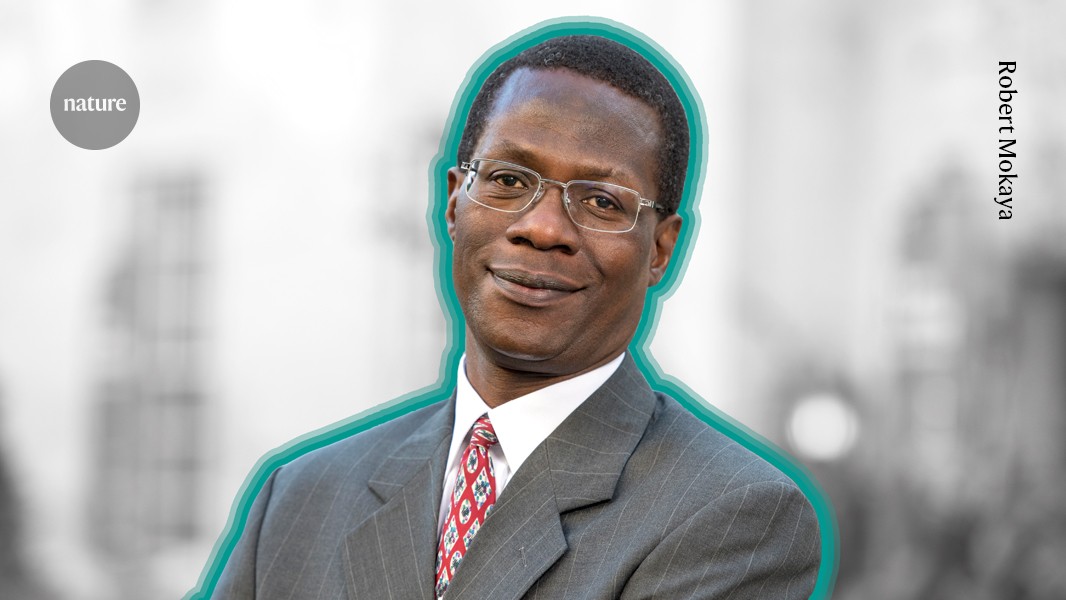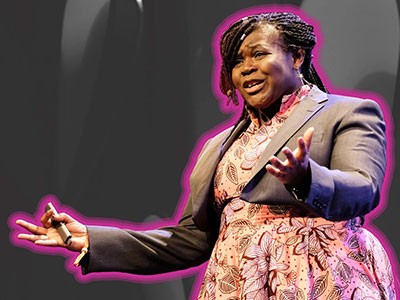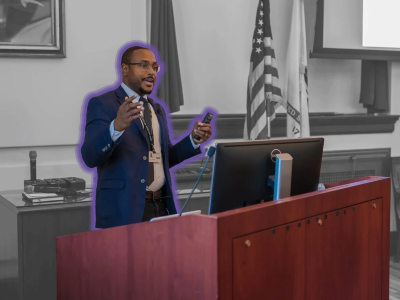For much of his career as a solid-state chemist in the United Kingdom, Robert Mokaya suspected that there weren’t many Black chemistry professors in the country. But it wasn’t until 2018 that he discovered he was the only one. Now a provost and deputy vice-chancellor at the University of Sheffield, UK, Mokaya also chairs the Royal Society of Chemistry (RSC) inclusion and equality committee, and will become the RSC’s president in mid-2026. In 2022, Mokaya was awarded the Order of the British Empire for his services to chemistry. Last year, he was elected a fellow of the Royal Society in London.
Mokaya’s research team explores ways to make the manufacture of porous carbon materials cheaper and more efficient. These materials can attract, absorb and retain gases such as carbon dioxide, methane and hydrogen, making these gases more viable for use as renewable fuels compared with other sustainable, low-cost options. In 2008, he co-founded the RSC Pan Africa Chemistry Network to increase the number of chemists on the continent through networking and skills-development programmes. Between 2016 and 2022, he led a collaborative project, the Africa Capacity Building Initiative, which was funded by the Royal Society and the UK government’s Foreign, Commonwealth and Development Office. This brought together UK and sub-Saharan African institutions and scientists to strengthen Africa’s capacity in synthesizing porous materials for storing gases. The project provided African chemists and institutes with training in field and laboratory practices and in writing research papers, and gave them access to state-of-the-art equipment.
Mokaya mentored Black students and early-career researchers during a previous post at the University of Nottingham, UK — sharing his experiences, offering advice and listening. He tells Nature how his curiosity about materials led to research to find renewable-energy solutions, and how his once “simplistic” view of the workplace evolved until he understood that a lack of diversity is “unacceptable”.
What is the great passion that has driven you as a scientist?
Since my childhood, I have been inquisitive, seeking answers to questions about how and why things are formed and why they look the way they do. This curiosity kept growing as I got older. So it was inevitable that I’d be attracted to a profession that speaks to my curiosity about materials. This passion then became a mix of curiosity and a desire to make a difference to peoples’ lives through science — I wanted to find solutions to some of the global challenges we face.
Maggie Aderin-Pocock on diversity: ‘It’s hard to find an argument against it’
Growing up in Kenya, I felt a responsibility to help create sustainable and reliable energy sources across Africa, which constantly has high death rates linked to air pollution caused by the burning of fossil fuels. In 2019, air pollution was the second leading risk factor for premature death in Africa. Now, my work seeks to find ways to prepare materials that might help to provide a renewable and sustainable replacement to fossil-fuel sources. The porous solids that my team works with could act to both store and catalyse carbon dioxide and hydrogen gases as fuels. They could also help to convert low-cost and readily available biomass materials and organic waste, such as oils from the tropical plant Jatropha curcas, into biodiesel.
Why is diversity and inclusion in science important to you?
A diverse research team performs better than a team of geniuses who have the same angles of thinking and insights. If we want science to address global challenges, we need high-performing research teams, which often come with the richness and diversity of their members’ knowledge, experience and heritage. When combined with dialogue and empathy, such diversity can create harmony and an environment that enhances performance.
If we want the best diverse teams, they cannot be achieved without a truly level playing field. Science practitioners should have equal opportunities to advance their careers. Anyone engaging in scientific practice shouldn’t be excluded. Here lies the importance of anti-racism in science. It isn’t an easy task to change ourselves to be fairer and more equitable.
When did you decide to tackle the lack of diversity in science?
That wasn’t a passion of mine earlier because I had a simplistic view of my workplace. Although I did not meet many people from diverse backgrounds, I assumed that anyone would be able to develop a career in chemistry. But as I progressed, I realized that people around me usually came from the same backgrounds and that this was part of the reason why I had never met any Black chemist working at my level in the United Kingdom. I began to wonder, because there are good number of Black undergraduates in chemistry, why are they less likely to attain a PhD?
The transformative moment came in 2018, when the RSC informed me that, according to their statistics, I was the only Black chemistry professor in the United Kingdom. I couldn’t believe the reality that was being revealed; I found it unacceptable. Now, more than ever, we need to fix the pipelines for fairer access to degrees. If I don’t get involved in this, who will?
‘There’s a lot of privilege masquerading as merit’: why inclusion matters in academia
I redoubled my efforts in outreach to under-represented groups in higher education and in highlighting inequality in the chemical-sciences community. I became the chair of the RSC inclusion and equality committee, which reports on inclusion and diversity data, offers training programmes for chemistry graduates from minority groups to develop their careers, and gives an annual award to honour an individual or team for their contribution to and impact on inclusion and anti-racism work.
I have also mentored several African students through their PhD studies and beyond. One of them was Stephen Otieno, who did his PhD at Maseno University in Kisumu, Kenya. Stephen is now a postdoctoral researcher in my group, which is still located in Nottingham, but will soon relocate to Sheffield.
How have you dealt with issues of racism or discrimination in your personal and professional life?
If I meet someone who treats me differently, I tell myself that the problem is not who I am, but something in them that they need to deal with. I tend to stay focused on keeping going, rather than falling into loops of frustration and negative expectations. I’m clear in my mind about staying disciplined and I don’t allow prejudice to affect me psychologically or bring me down. I always maintain a pleasant and calm demeanour when faced with discrimination, because I know that I’m not the problem.
What do you think of the assertion that anti-racism work is ‘wokeness run amok’, or is a waste of time?
I rely on statistics to argue with those who hold these views. I would say, “look at the statistics that say members of some sections of society are excluded from science participation. Wouldn’t it be right to create a more equitable environment in which everyone can participate?” But such an argument must also be clear about how the efforts made will lead to improvement, and therefore are not a waste of time.
Tell us something about your life outside science — what is your favourite dish?
Since my childhood in Kenya, I have been hooked on a meal called ugali in Swahili and obokima in the Kenyan vernacular. The dish is made from ground white maize (corn), which is usually made into a porridge and served with an abundance of savory spicy gravy and meat, such as beef stew or goat ribs, or with sauteed turnips cooked separately, alongside vegetables such as broccoli, Chinese onions, mushrooms or green cabbage.
This interview has been edited for length and clarity.




